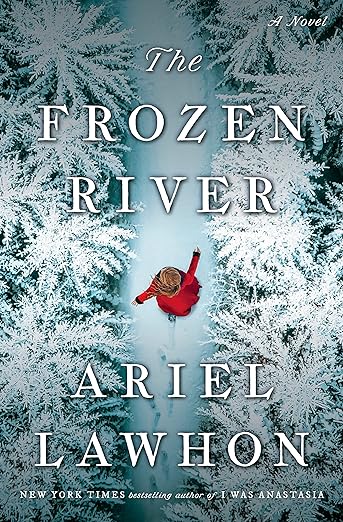Over the course of one winter, as the trial nears, and whispers and prejudices mount, Martha doggedly pursues the truth. Her diary soon lands at the center of the scandal, implicating those she loves, and compelling Martha to decide where her own loyalties lie.
Clever, layered, and subversive, Ariel Lawhon’s newest offering introduces an unsung heroine who refused to accept anything less than justice at a time when women were considered best seen and not heard. The Frozen River is a thrilling, tense, and tender story about a remarkable woman who left an unparalleled legacy yet remains nearly forgotten to this day.
Comment: My buddy reading pal suggested that we would add a third read this month, besides the usual two a month we already do. I had seen this being well praised in several places, but somehow got the idea it would not have a positive ratio in relation to sad/darker content and I didn't feel like trying it. Due to her suggestion, I did and it ended up being a lot more appealing than what I had anticipated.
In the late 18th century, in Maine, Martha Ballard is a midwife in her small town and she takes her role very seriously. She also had the luck of marrying a good and supportive husband, and they had several children. Her life is what one would expect but everything changes when Rebecca Foster, the pastor's wife, is raped by two men, which she later identifies when presenting an official complaint. One of them is the local judge and the other a man who shows up dead, as soon as the story begins. As the events progress, Martha tries her best to help her friend Rebecca, to keep helping mothers giving birth, to help her children find happiness and to prove a woman can be as worthy of defending as a man...
This is the first book I try by this author. I really didn't pay much attention to blurbs and such before starting the book, I wasn't even fully aware this would be an historical, but it turned out that it was quite a pleasure to read the book. My favorite aspect about it is that it wasn't as depressing or filled with dark/hopeless situations as I feared. Of course bad and unfair situations happen, but the story is told by Martha and her personality (along with the author's choices) helped the story feel lighter.
I'll have to admit I became a fan of Martha throughout the novel. She is a woman living at a time where women had no real rights, and if the men around them weren't fair or decent, they would have very little ways to have a voice. Martha was lucky to marry a good man and another element I absolutely loved was how much in love they were after decades of marriage, of challenges and struggles - some of which we learn about as the narrative moves along - but everything was done with trust and they respected each other's opinion in regards to the most mundane things. I was very happy to see scenes with them, because then the story wasn't only about the terrible main plot issue.
The story happens mostly during the winter season, and that is also a key element for why the plot works out the way it did. A few little elements wouldn't have been possible if things had been set in summer, mostly due to the consequences of the weather and how that impacted people's lives. This also gave the stoty a slightly darker feel, as often we feel about winter and smaller days, and darker days and more difficulty to perform certain tasks. The atmosphere was very well achieved, I'd say.
The main plot is centered on the investigation of the rapist's death. He is found frozen on the river and Martha, as midwife, checks out the body and realizes he had been hanged before he was thrown into the river. For plot reasons, a new and young doctor had arrived at the town and his opinion was obviously different. I thought perhaps the story would be about this, man vs woman and who would people believe, but thankfully the story was a lot richer in elements and not this limited. Of course, we still have plenty of comments here and there, mostly thought by Martha, on the injustice of a woman's role and so on...
The book is quite long, my ebook edition had a little over 400 pages, and I do think some sections could have been edited a bit more. That aside, it was still a great pleasure, as I've said, to read the novel and keep turning the pages. As one can imagine, the real mystery isn't exactly who killed the frozen man or why - everyone suspects he was killed because he had raped Rebecca - but why that way, why in that sequence of events and what kind of connection did he have with the judge who was also accused. The real mystery lies there, why did this important judge allegeddly raped Rebecca too...

I skimmed your review, because I have an ARC of this book and hope to read it myself (one of these days...); however, I have a vague idea that this is based on an historical figure and actual events. (Found it: Martha Ballard)
ReplyDeleteI am very glad that the novel isn't overly focused on the saddest (or most enraging) parts of the historical period; I'll try to come back after I've read it, see how close we are in our takes.
I think this book was very well achieved and I loved the family connections and how they were shown. I think you will like reading it!
Delete